
by Judy Corbus | Aug 28, 2024
With summer in full swing, you’ve probably noticed an uptick in your electricity bill. The hot temperatures and high humidity have been giving your air conditioner a real workout! Since your heating, ventilation, and cooling (HVAC) system uses the most electricity of any item in your home, taking steps to improve its efficiency will save energy and money. Try these five easy ways to stay cool for less:
Adjust the thermostat. Set the air conditioner thermostat to 78o F. For every degree setting below 78o F, you spend up to 4% more in cooling costs.
Use fans. Ceiling and floor fans move air to create a breeze, which can make a room feel up to four degrees cooler than the actual temperature. This allows you to set the thermostat higher and still be comfortable. Ceiling fan blades should move in a counterclockwise direction to create a downdraft – you can adjust the direction by moving the switch located on the side of the motor casing. Tip: Fans cool people, not rooms, so turn off the fan when you leave the room to save more money on your power bill.
Use window coverings to control sunlight. East- and west-facing windows catch the brunt of the sun’s heat, adding extra warmth to those sides of your home. Keep blinds and drapes closed to block out morning or afternoon sunlight so your air conditioner doesn’t have to work harder to cool those rooms.

A dirty filter forces your HVAC system to work harder, raising your power bill and shortening the lifespan of the unit.
(Photo source: Judy Corbus)
Change the air filter. Dirty air filters restrict airflow and may cause the HVAC system to run longer, increasing your energy bill and potentially shortening the life of the unit. Many newer HVAC systems shut down if the filter becomes too clogged for air to pass through the filter; this prevents the compressor motor from overheating. When this occurs, a service technician must inspect and reset the unit, resulting in a service charge. During periods of high use or if you live in a dusty area or have pets, check and change your filter monthly, even if the filter is labeled to last three months. Pick a day that’s easy to remember, like the first of the month or when you receive your power bill in the mail. Make sure you use the filter type and size recommended by the manufacturer for optimal efficiency. While you’re at it, dust your ceiling fan blades, too!
Have your HVAC system serviced at least annually. Schedule a maintenance check on your unit at least once a year. A trained technician will check the coolant level, drain line, and overall system to make sure everything is operating at peak efficiency. If you live in a manufactured home, it’s especially important to check the ductwork to ensure it has not separated at the seams, resulting in a loss of cool air inside and higher electricity bills. Routine maintenance will head off potential problems, extending the life of your unit and promoting efficient operation for reduced power bills. Tip: Prune back shrubs that may block airflow to your air conditioner compressor.
These simple tips will help to cool down your power bill while you stay cool!
For more energy-saving tips, visit the Florida Energy Systems Consortium.
An Equal Opportunity Institution.

by Judy Corbus | Nov 2, 2020
Ahhh…Fall! I love this time of year – changing leaves, cooler temperatures, and lower humidity make it a joy to be outside. It’s also the perfect time to give your house some TLC after the summer heat and before the cold winter winds blow. Regular maintenance keeps your home healthy, can lower your power bill, and saves you money on costly repair jobs as you catch them early on.
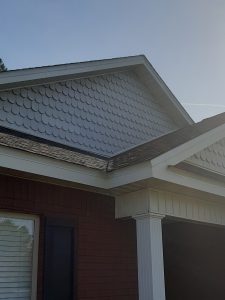
Clear roofline “valleys” of debris to reduce the risk of leaks. Photo source: Judy Corbus
Here are eight things to check inside and outside your home this fall:
Check weather-stripping and caulking around windows and doors. Check for signs of leaks, then repair or replace as needed. This keeps your heated or cooled air in and pests out.
Paint exposed wood. Check eaves, doors and frames, and other wood surfaces for chipped or flaking paint and touch up with a fresh coat to protect against rotting.
Check windows and doors for smooth operation. Install or patch screens, lubricate window tracks and door hinges, and repair as needed.
Clean gutters and downspouts. Use gloved hands or a trowel to scoop out debris from gutters. Flush downspouts with water or use a drain “snake” to clear blockages. Make sure they discharge water 2-3 feet away from the house to protect the foundation; a downspout extender can funnel water further away from the house. Clear gutters and downspouts allow water to drain properly from your roof to reduce the risk of leaks.
Clean roofline “valleys.” The V-shaped area where two roof slopes meet is the perfect catch-all for leaves, pine straw, and other debris. If allowed to accumulate, this debris can trap moisture, leading to a breakdown of the roofing material and eventual leaks. Use a leaf blower to clear the valleys to keep your roof dry and water flowing freely off it.
Clean the chimney. If you plan to use your fireplace, have it inspected and cleaned by a professional chimney cleaning service before you light the first fire of the season. This will remove creosote, an oily by-product of burned wood that builds up inside the chimney and increases the risk of chimney fires.
Change the batteries in all smoke and carbon monoxide detectors. This ensures the batteries are fresh, whether your detectors are hardwired, with a battery backup, or completely battery-operated. Test detectors regularly to ensure they are operating properly.
Have your heating and cooling system serviced. Your service professional will make necessary tune-ups, so your system operates efficiently for a comfortable environment and lower utility bills.
For a complete home maintenance checklist, click here.
Adapted from: https://www.fcs.uga.edu/extension/healthy-housing#mantained

by Angela Hinkle | Sep 15, 2020
Most of us know there is a great deal of cleanup after a disaster hits. But how often do you think about what to clean before disaster strikes?
Here are some helpful cleaning measures you can do before a storm or other calamity so your burden is not so great after.
Outside
Mow the Lawn
If your lawn is mowed low and even now, you won’t have tall grass to trudge through later. Refill any gas cans and/or re-charge any lawnmower batteries after mowing. It will be much easier to pick up and remove any debris that lands on the mown lawn. And you may need to use the gas in the filled can to operate other equipment for the after-cleanup.
Trim, Whack, and Blow
Trim the hedges, whack down those weeds, and blow those leaves now. Otherwise, you may later find yourself with a big mess on top of a big mess.
Bring It In
Bring in any garbage cans, lawn furniture, or other yard items that could make a mess if blown over, broken, or made into dangerous shrapnel.
Inside
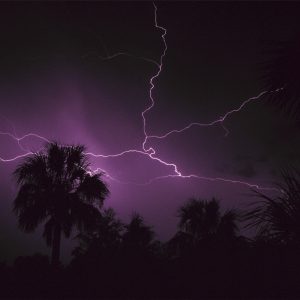
Lightning storm. Photo Source: UF/IFAS
Leave No Piles
Make sure there are no dirty dishes in the sink or the dishwasher. Make sure everything is cleaned, dried, and put away. Then, if you lose electricity after the storm or are not sure of the safety of your water, you don’t have to worry about clean plates to eat on, glasses to drink from, or utensils to eat with. And you don’t have a mess to look at or a stink from the sink to deal with.
Clean, dry, and put away all the dirty laundry now. If you lose that all-important electricity later, you won’t have to worry about stepping over piles of clothes or wonder how you’re going to deal with wearing the same dirty clothes over and over again. If you have a generator, you could use that to clean your clothes, but most of the time those generators are best used to keep food safe in the refrigerator or to operate emergency equipment.
Scrub
If your bathroom tub is scrubbed clean now, you can fill it with water for flushing toilets, cleaning, or purifying and using as extra drinking water. You can also take a relaxing, cleansing bath from a hard, dirty day’s work after the storm.
And cleaning a dirty toilet now means you’ll have one less thing to have to deal with later – along with everything else on your to-do list.
Get Rid of It
Make sure the garbage can, recycle bin, and compost container are all emptied. The last thing anyone needs is old piles of trash with new piles of trash added on top.
Been meaning to give away those extra items (knick knacks, doodads, toys, etc.) you don’t use or like anymore? Doing that now makes for a cleaner house as opposed to having more “stuff” in the house, adding to the mess you may have to deal with later.
Clear the Clutter
Pick up papers, bills, tools, and any other important items that may be on various surfaces throughout the house (you may actually want to eat on that dining room table some day). Then organize them together in a safe place. This helps to keep them from getting water damaged or tossed around and you’ll be able to find them later.
Have your emergency kit filled and ready to go in a plastic tub or waterproof container. Make sure everyone in the house knows where it is. For other disaster preparation and recovery resources, go to https://disaster.ifas.ufl.edu/ and/or talk with your county UF/IFAS Extension Agent.
If your home or property are destroyed in a disaster, these measures probably won’t really help much. But if all is not lost and there is just some debris and damage cleanup to be done after a large weather event, the above measures taken before can alleviate a lot of extra stress after. And if there is no disaster, hey, your house is nice and clean. Relax and enjoy it!
Make sure you clean before disaster strikes.

by Julie McMillian | Jun 22, 2020

Today’s Climate
Photo Source: UF/IFAS Photo Database
Many confuse the two words climate and weather. Weather is the day to day conditions of our atmosphere. Whereas, climate refers to the average of the weather over time. Weather depicts how we dress day to day and can change often. Climate refers more to the average weather over time. We generally must prepare for our climate by buying appropriate clothing and preparing our home for longer term weather conditions.
What causes the climate to change? There are three important greenhouse gases that have dramatically increased since industrialization: carbon dioxide, nitrous oxide and methane. The increases are primarily due to our changes in land use over time. These factors make our earth’s surface temperature warmer which affects our loss of sea ice and longer fire seasons, and can contribute to extreme weather events.
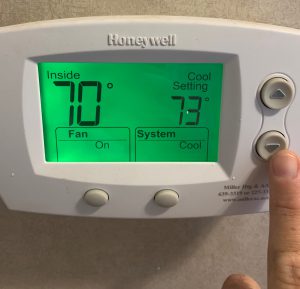
Adjust the temperature
Photo Source: Julie McMillian
The question is, what can I do in my own world and community to help on an individual basis? There are several ways that we can reduce our energy use of electricity at home which will help us to contribute to the bigger picture. Some simple suggestions are when you are not using the television, computer, lights, heating and cooling, try to turn them off or down for a while. Purchasing shades or curtains for your windows can keep your house cooler in the summer and fans may be able to replace the air conditioner on some occasions. When running the air, heat or hot water heater check your thermostat for energy saving features. Try to only run the dishwasher or washing machine with full loads and be sure to clean out your lint trap in the dryer so it has good airflow. You will find you might even save a few dollars by being mindful of your energy consumption.
Next, let’s talk about reducing greenhouse gases in our yards. Composting food scraps is a great way to reduce waste from landfills and turns your waste into reusable soil. Planting trees and plants helps to reduce carbon dioxide in the atmosphere. Plants store carbon and help to regulate temperatures in the home. Another thing to consider is, where does your water run off go? If water can be routed to your garden it is a win-win.
How do we plan our food system in our home? Reducing food waste has many benefits. We can save money, help our community, conserve energy and resources just by rethinking the way we plan our meals. If we buy more unprocessed foods, there will be less packaging. If we are able to grow our own food or just eat at home more, it cuts down on trips to restaurants and stores.
These are just a few ways to get you thinking about climate change in Florida. As a citizen, we can take action by staying informed and showing our support. If we hold ourselves accountable by looking at our personal impact, we may be surprised what we are leaving behind with our footprint. For more information on healthy living or other extension related topics, contact your local UF IFAS county extension office.
Supporting information for this article can be found in the UF/IFAS Extension EDIS publications:
Science Support for Climate Change Adaptation in South Florida
Climate Change Adaptation: New Perspectives for Natural Resources Management and Conservation
Energy Efficient Homes
UF/IFAS Extension is an Equal Opportunity Institution.

by Heidi Copeland | Mar 25, 2020
It’s hard to believe, but Wednesday, April 22, 2020 marks Earth Day’s 50th anniversary. As far as anniversaries are concerned, the 50th is definitely a milestone, often commemorated with something lasting and treasured.
Kind of ironic then that this year’s Earth Day theme is “Climate Change.” According to the Earth Day Network, this theme represents the biggest challenge to the future of humanity and the life-support systems that make our world habitable.

All these tiny pieces of plastic started out as bigger pieces of plastic, which broke down over time and ended up in our waterways. (Photo source: Tyler Jones, UF/IFAS)
This year’s theme harkens back to 1970, when the first Earth Day was celebrated with an objective to spread awareness. Twenty million Americans (10% of the country’s population at the time) protested environmental ignorance and demanded protections for our planet. These demands eventually led to the passage of landmark environmental laws in the United States, including the Clean Air, Clean Water, and Endangered Species Acts. Many countries soon adopted similar laws.
As Extension agents, we are tasked with providing research-based, reasonable, and helpful information on a variety of topics that can improve people’s lives. Climate change is a divisive issue. In fact, a University of Florida IFAS Extension EDIS fact sheet called “Challenges in Communicating Climate Change to Extension Audiences” outlines the many challenges of discussing climate change with typical audiences.
| Six Americas Audience Categories |
Description |
You might hear |
| Alarmed |
Convinced global warming is a serious and urgent threat; highly engaged; most likely to change behavior |
I’m so upset and worried about the future. |
| Concerned |
Convinced global warming is a serious threat; somewhat engaged; less likely to change behavior |
I think this is something politicians should address |
| Cautious |
Believe global warming is a problem but not a personal or urgent threat |
So what is it all about? |
| Disengaged |
Give little thought to global warming; change beliefs easily; not perceived as a problem for them |
I have other things to think about, like how to pay the bills. |
| Doubtful |
Not sure if global warming is happening |
Seems like climate always changes. This is a political issue. |
| Dismissive |
Firmly believe global warming is not occurring; highly engaged in preventing change in policies; very knowledgeable |
It is arrogant to believe that people can change the climate. This graph shows the scientists have it wrong. |
Nonetheless, Extension agents are well-informed and desperately care for the health and welfare of their families, neighbors, and communities. Especially now, as collectively, we all are facing an uncertain future.
The coronavirus pandemic has stressed our lives right now. Everyone is grappling with change. Everyone is worried about human health. Even with everything else going on, Earth Day is a yearly reminder to exercise our collective responsibility. As one human race, we just can’t sit back and relax and hope everything turns out okay. It is going to take some work.
So instead of feeling like our time is being wasted by staying at home, perhaps we can spend this time in a positive way. I heard a news commentator recently say something along the lines of not letting this time we all have now to use us, but for us to use this time to come out better on the other end.
Like Helen Keller famously said, “Alone we can do so little; together we can do so much.” Let’s start together.
Here are some tips and resources for saving energy, money, and the environment:
Save Energy, Save Money (https://www.energy.gov/energysaver/energy-saver)
-
- Install a programmable thermometer
- Hang clothes to dry when you can
- Look for energy star appliances when shopping for a replacement
- Change to energy efficient light bulbs
Understand personal water consumption (https://www.epa.gov/watersense/how-we-use-water#Daily%20Life)
Say NO to plastic (https://www.epa.gov/trash-free-waters/toxicological-threats-plastic)
-
- Carry your own reusable bag
Eat with a conscience (http://www.floridaclimateinstitute-uf.org/)
-
- Eat more meatless meals
- Don’t waste food
- Cook more
Think about personal consumption (https://moneytalk1.blogspot.com/2020/03/when-things-seem-out-of-control-control.html)
-
- Consume less
- Waste less
- Enjoy yourself more
Support your leading environmental movements. Youth around the globe are passionate about this. They worry, and rightly so, about what is going to happen, now and in the future.
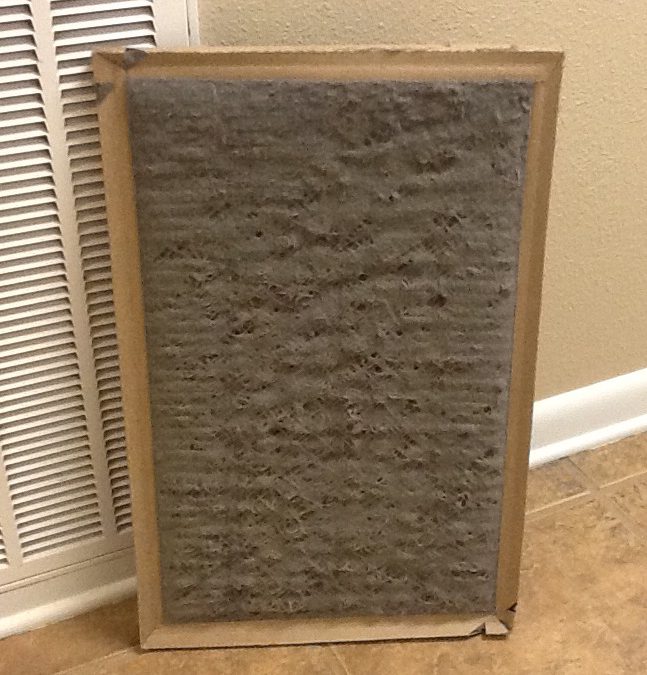
by Judy Corbus | Jul 10, 2018
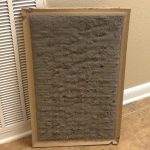
Check your air conditioner filter monthly and replace when dirty.
Photo Source: UF/IFAS Northwest District
When the temperature is in the 90s and the heat index in the triple digits, you certainly don’t want your air conditioner to conk out! Follow these simple steps to keep your AC running efficiently and to save money on your electric bill:
Check the filter monthly. Your air conditioner’s filter catches dust, dirt, and allergens to keep your home cleaner. During periods of high use, like summer, a lot of air passes through the filter so it can become dirty more quickly. If you live in a dusty area or have pets, these, too, can “fill” your filter so be sure to check your filter monthly and clean or change it as needed. Some filters are washable and reusable, such as in window unit air conditioners. To clean, turn off the unit and remove the filter. Wash in warm, soapy water and allow to air dry; reinstall in unit. Replace the filter if it is worn or torn. Inspect and replace window seals to prevent cool air leaks.
Central air conditioning systems typically use disposable filters. Turn off the system to prevent dust and dirt from entering the unit while you are cleaning it. Open the intake grate and remove the filter. Hold the filter up to a light; if you see very little light through the filter, replace it. Make sure to install the new filter so the air flows in the direction indicated by the arrow on the filter frame. Also, dust the grate with a soft cloth. Use the filter type recommended by the manufacturer for best performance; keep a supply on hand so you can change them regularly. Pick a day of the month, such as the 1st or when you receive your electric bill, to check the filter. This also is a good time to dust your ceiling fan blades.
Does a clean filter make a difference? A clogged filter makes your air conditioner work harder to pull air through the filter. Many of the newer air conditioning units now have a safety feature that shuts down the unit if air cannot pass through the filter to prevent the compressor from overheating. When this happens, a service technician must inspect and reset the unit, resulting in a service call charge. Getting in the habit of checking and changing your filters regularly will keep your unit operating efficiently and extend its usable life. You can reduce your air conditioner’s energy consumption by 5 to 15 percent by maintaining clean air filters (www.energy.gov).
Clean leaves and other debris from the fan, compressor, and condenser. Trim shrubbery so it is at least two feet away from the outside unit to allow for proper air flow.
Check and clean the evaporator coil every year.
Use a “fin comb” (available at hardware stores) to straighten bent coil fins.
Twice a year, insert a stiff wire through the drain channels to clear and prevent clogs, which can lead to backups and flooding.
Have your air conditioner serviced at least once a year. Spring is an ideal time to have a qualified service technician inspect and service your unit so it can handle the demand of the hot summer months.
Keep your “cool” this summer with these maintenance tips!
For more information, visit:
Energy Saver 101: Everything You Need to Know About Home Cooling
Florida Energy Systems Consortium













